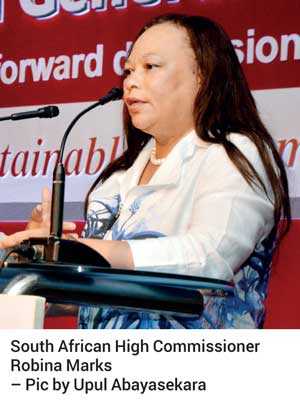Friday Feb 27, 2026
Friday Feb 27, 2026
Thursday, 18 July 2019 00:18 - - {{hitsCtrl.values.hits}}
What would be the role of businesses in creating a sustainable economic resurgence? Speaking from experience, South African High Commissioner Robina Marks stated that the primary role of businesses is to play an active part in uniting a country, for both their own survival and sustainability, and for the country’s economic development.
“Across the world, South Africa was seen as a pariah state because of apartheid that separated races…. We were ostracised by the international community,” she said, adding that the international anti-apartheid movement was successful in applying sanctions against South Africa. This in turn snowballed into civil society, who refused to buy and consume South African products, as that was seen as tantamount to condoning apartheid. 
The country soon hit an all-time low, as the South African economy was in free-fall.
“From the mid-1980s, foreign governments and businesses cut many economic ties with South Africa, and in 1985, international banks began refusing to roll over short-term debt with the result that, over the next year, the country would have to pay $ 1 billion in loans. Inflation rose to 16%, the currency tumbled and the government introduced exchange controls. By 1986, over 100 multinationals had disinvested from South Africa,” the High Commissioner said.
However, the country was able to turn themselves around, in just 25 years. South Africa is now considered to be a leader in the African continent, with a GDP of $ 385 billion, compared to Sri Lanka, which has a GDP of $ 90 billion. High Commissioner Marks attributes this to an invisible role played by their business community and private sector. She does reveal that the reason businesses played such a leading role was that they “quite frankly, didn’t have a choice”.
The economy was down, domestic consumption was down, and the international export market was shrinking. In this climate, the private sector had two choices — to help the apartheid government and white society, or to help build a climate of trust in which the political leaders could move the country towards a more stable future. They chose the latter.
The role played by the business community
In moving towards a more prosperous and united future, the private sector banded together to push South Africa towards success.
“They funded efforts at maintaining the peace. They knew that it was in their own interest to make concessions around a decent living wage that would quell the many industrial strikes that we had at the time. Many of them improved their working conditions, improved salaries to workers, and offered scope for promotion to their black workforce.”
They basically helped to market the vision of a non-racist South Africa to the international community.
“They were vocal about the fact that the country was on the right track, that good, fair and inclusive governance could also be good for business, and more importantly, because they had vested personal and business interests, that they had no intention of leaving. So when prominent companies like Anglo American started “selling” the new SA, the outside world took notice that there would be no local capital flight,” she said.
Another point of importance was that the business leaders all stayed back. According to her excellency Marks, ‘nothing demonstrates confidence in a country more than staying and not leaving for what might be seen as greener pastures.’
The High Commissioner made these remarks at a panel discussion on ‘The Role of Business in Sustainable Economic Resurgence,’ conducted by the Ceylon Chamber of Commerce at their 180th Annual General Meeting held recently.
Responding to a query by the moderator, Ganaka Herath, on what could be done for gender equality, Marks highlighted that socio-cultural expectations of women needing to stay at home, had to change.
“I think that we all know that female participation in the workforce has gone down considerably, by 10%-12%; because of unfriendly environments. There isn’t a sense of understanding work-life challenges,” she said, adding that we all needed more men like her co-panellists — Dr. A.T Ariyarathne and Mahesh Amalean — as role models.
The business of business is not only business, she stressed, and any company that ignores the impact that an uncertain external political environment have on their bottom line is doomed to fail.